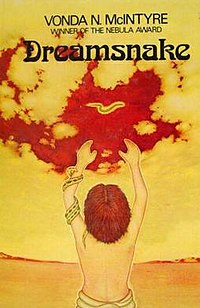The 1970s were a great decade for science fiction. There
many great books ranging from hard SF stories about ringed planets and
self-contained ecosystems in space craft to soft SF stories of cloning and
individuality and genderless societies to stranger tales of resurrected people
living on the banks of an endless river and three gendered aliens. It was the
first decade a woman, Ursula Le Guinn, won the Hugo Award. In fact, four out of
the ten 1970s winner were written by women including 1979’s Dreamsnake by Vonda N. McIntyre. In a
decade of great highs, Dreamsnake holds its own but does not reach the heights
of such classics as The Left Hand of
Darkness, The Forever War, and Gateway.
Dreamsnake
takes place far in the future after a nuclear war has rendered vast swaths of
the landscape radioactive. Yet it is not a desolate world with small groups
struggling to survive. Society has reformed and the old world is mentioned only
in passing. I love how McIntyre implies years of history to the world without
giving too much detail. Like the
Hechee in Gateway, the reader is only
able to guess and infer what has happened. For example, title creature is from
another planet but the reader is never told what planet, why they came to Earth
or how brought them there. Further on that point, the main character goes to a
city that still trades with aliens but she is unable to get in and we the
readers never learn anything about the aliens and very little about the closed
city that trades with them. It’s a nice mystery that enhances rather than
detracts from the story.
The
story itself is about a healer named Snake who uses three snakes; a
rattlesnake, a cobra, and the eponymous dreamsnake, and her trails to replace
the dreamsnake after a misunderstanding with some tribespeople led to its death.
Snake’s journey is not straight path since she does not know quite how to replace
the rare dreamsnake and is loath to return to the healers and admit her
failure. She travels through the land, helping people as she can with her two remaining
snakes, picks up a companion, and ultimately succeeds in her goal. While that
may seem like a spoiler but how Snake accomplishes it a bit surprising but felt
completely organic and not contrived.
It might
sound strange how snakes are used for healing but McIntyre explanation is
original. The snakes are specially bred to metabolize medicines within their
systems. Snake feeds the rattlesnake or the cobra a compound that turns their venom
into whatever medicine she needs and the repurposed venom attacks the illness
with the same ferocity that it would have as a poison. She uses the snakes to
transmit vaccines to nomads and kill a nasty infection in a wounded leg. The
dreamsnake’s purpose is different, however. The dreamsnake takes away the pain
and calms people. It can be used to calm a person who is undergoing surgery or
suffering from an illness or ease the passing of a dying individual. Without,
Snake feels she cannot do her job sufficiently. It is an interesting and well
realized idea that helps to show this future world as both similar to our
current world but alien as well. While much of the world is less advanced that
our world, for example people use horses instead of motor vehicles and some
live nomadic lives, in some ways it is more advanced. The snakes are shown to
be more effective that modern medicine and people are able to control their own
biological functions to such a degree that unwanted pregnancy is virtually
unknown. It is a great world and I do wish that McIntyre had created more
stories within it.
There
is really not much else to say. Dreamsnake is a thoroughly enjoyable science
fiction tale that entertained me but did not leave the lasting impression that
some of the greatest works did. I am find with this. When I started this
strange project a few years back, I did not expect every work to be great but I
did hope that every work would be good. What is important is that Dreamsnake
was good and I am glad this little project brought it to my attention.
My next
blog will be summary of my impressions of the 1970s as I did with the 1950s and
the 1960s. After that it is one of the three “Greats” of science fiction:
Arthur C. Clarke and his 1980 novel, The Foundations of Paradise. Happy reading
until then!



